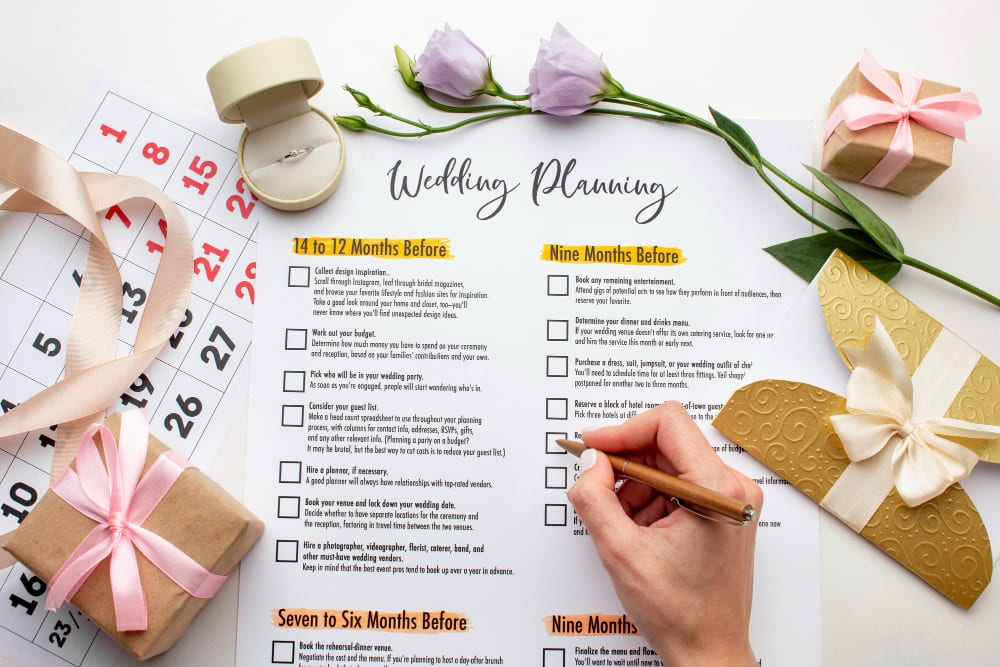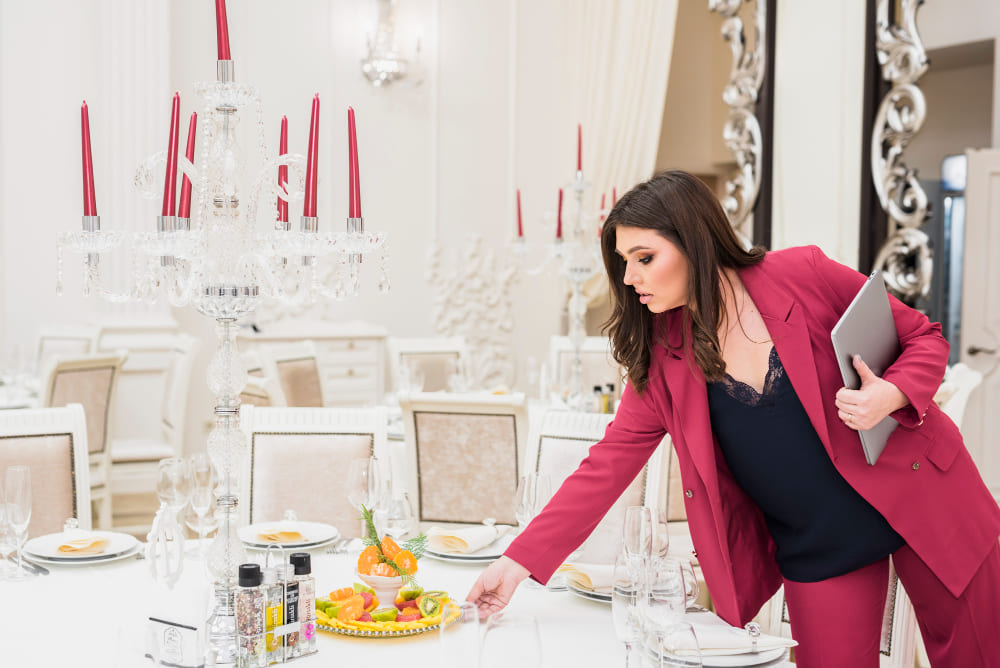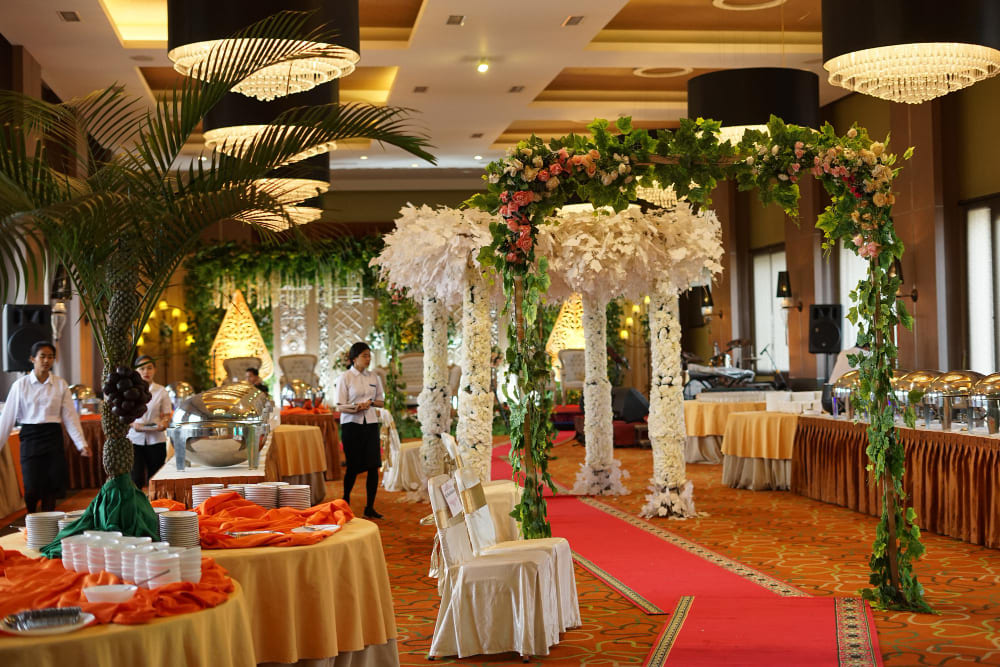What Wedding Planners Do: Roles, Responsibilities


Introduction
Planning a wedding can be an overwhelming experience, filled with countless decisions, tight deadlines, and high expectations. This is where wedding planners step in, transforming what could be a stressful process into a seamless, enjoyable journey. A professional wedding planner doesn’t just coordinate logistics—they bring expertise, creativity, and a calming presence to every stage of the wedding planning process. From managing budgets to liaising with vendors, wedding planners ensure that every detail aligns with the couple’s vision while maintaining timelines and minimizing stress.
Whether it’s a small intimate gathering or a lavish celebration, couples increasingly recognize the value of hiring a wedding planner. Beyond logistics, planners provide guidance on style, trends, and best practices, helping couples make informed decisions. Their knowledge of local vendors, venues, and industry standards ensures that weddings not only run smoothly but also reflect a unique, personalized touch. In this article, we’ll explore the essential roles, responsibilities, and benefits of wedding planners, offering insight into why these professionals are crucial to creating memorable, flawless weddings.
Understanding the Role of a Wedding Planner
Wedding planning can quickly become overwhelming, with countless details to coordinate, from venues to vendors. This is where a wedding planner steps in, taking the stress off the couple and ensuring every aspect of the day runs smoothly. Wedding planner roles go far beyond simple coordination—they provide expert guidance, creative ideas, and practical solutions. Couples benefit not just from their organizational skills but also from their industry knowledge, which can save time, money, and even potential stress on the big day. Essentially, a wedding planner serves as both a strategic organizer and a creative consultant.
What Is a Wedding Planner?
A wedding planner is a professional who assists couples in planning, organizing, and executing their wedding. They manage tasks such as scheduling appointments, negotiating contracts with vendors, and designing the overall theme and flow of the event. Beyond logistics, wedding planners provide emotional support and practical advice, ensuring the couple enjoys the process rather than feeling overwhelmed. Some planners offer full-service packages, covering every detail, while others may provide partial services, such as day-of coordination or vendor recommendations.
Why Couples Hire Wedding Planners
Couples hire wedding planners for a variety of reasons, but the most common is to reduce stress and ensure a seamless experience. Planners bring expertise that helps couples make informed decisions about venues, catering, décor, and budgeting. Hiring a wedding planner also allows couples to focus on enjoying their engagement, knowing that experienced professionals are handling the complex logistics. Additionally, planners often have established relationships with vendors, which can lead to better pricing and smoother coordination. This combination of expertise, time-saving, and peace of mind makes wedding planners a valuable investment for many couples.
Initial Consultation and Vision Planning -
The first step in a wedding planner’s role begins with the initial consultation. This meeting lays the foundation for all the planning that follows. During this stage, the planner gets to know the couple, learns about their personalities, and understands their expectations. It’s not just about the logistics; it’s about connecting on a personal level and capturing the couple’s vision for their big day. By asking thoughtful questions and offering early insights, a good planner helps transform vague ideas into a structured plan. This phase is essential because it allows both sides to align on budget, priorities, and overall direction before diving into the details.
Getting to Know the Couple
One of the most important aspects of the consultation is building a relationship with the couple. A wedding is deeply personal, so the planner needs to learn about how the couple met, what traditions matter most, and which elements they absolutely cannot compromise on. This conversation helps uncover personal touches — like favorite colors, family customs, or unique love stories — that will influence the event’s design. For example, a couple who loves traveling might prefer a destination-themed décor, while another may prioritize religious rituals. By understanding these desires early on, planners can make tailored recommendations that reflect the couple’s values and create a memorable celebration.
Defining the Wedding Style and Theme
Once the couple’s personalities and priorities are clear, the planner works on shaping the wedding’s overall style and theme. This step goes beyond picking color schemes; it’s about creating a cohesive experience for guests. Some couples may lean toward a traditional ceremony with classic elegance, while others may desire a modern affair with bold, unconventional details. A wedding planner helps bridge the gap between imaginative ideas and realistic execution. They present mood boards, suggest décor inspirations, and outline how different elements like flowers, attire, and venue décor can be tied together. By guiding couples through these decisions, planners ensure the wedding feels consistent, polished, and uniquely personal.
Budget Management -
Managing the wedding budget is one of the most crucial responsibilities of a wedding planner. Couples usually start with an estimated cost in mind, but without professional guidance, expenses can quickly spiral out of control. A skilled planner helps balance the dream vision with financial realities so couples can enjoy their day without constant stress about money. This process involves breaking down every category — from venue and catering to attire and entertainment — and setting clear allocations for each. By doing so, planners prevent overspending in one area that could jeopardize the rest of the event. Their expertise ensures that financial decisions align with the couple’s priorities, making the wedding both enjoyable and financially manageable.
Setting a Realistic Budget
The first step in financial planning is establishing a realistic budget that reflects the couple’s overall vision. Wedding planners assess initial expectations, number of guests, and desired scale before mapping out an accurate cost estimate. For example, a couple dreaming of a beachfront ceremony with luxury décor will need a higher budget compared to one hosting an intimate backyard celebration. A planner also educates couples about hidden costs such as service charges, taxes, or last-minute décor upgrades that are easy to overlook. By creating a transparent financial roadmap, wedding planners empower couples to make informed choices while avoiding unpleasant surprises. This thoughtful groundwork helps transform a vague “ballpark figure” into a structured plan with clearly defined spending categories.
Tracking Expenses and Payments
Once a practical budget is established, the real challenge is keeping track of spending throughout the planning journey. Wedding planners act as financial gatekeepers, maintaining detailed records of all deposits, vendor payments, and upcoming due dates. This prevents couples from missing deadlines, which could risk losing bookings or incurring penalties. For instance, with multiple vendors involved — caterers, florists, photographers, and entertainers — payment timelines can get overwhelming. A planner streamlines the process by creating schedules and reminders so that every transaction is managed on time. They also review contracts carefully to ensure that couples are not overcharged or subjected to unnecessary fees. By handling invoices and receipts systematically, wedding planners provide peace of mind that no dollar is unaccounted for, ensuring the budget stays on track from start to finish.
Vendor Coordination -
One of the most time-consuming yet essential aspects of wedding planning is vendor coordination. From catering and photography to floral arrangements, entertainment, and décor, a wedding involves multiple service providers working in sync. A wedding planner takes on the role of the central point of contact, ensuring every vendor understands the couple’s vision and timeline. This coordination minimizes miscommunication, prevents delays, and creates a seamless flow on the wedding day. Instead of the couple juggling countless calls and meetings, the planner streamlines the entire process. Their professional connections and organizational skills help guarantee that each vendor delivers their part flawlessly, contributing to an event that feels cohesive, personal, and stress-free.
Finding the Right Vendors
Selecting the right vendors is a task that requires both research and industry knowledge. Wedding planners often have a trusted network of professionals they can recommend, saving couples from the overwhelming process of sorting through endless online options. The best vendors don’t just fit the theme — they also align with the couple’s budget, personality, and expectations. For example, some couples may prioritize organic catering, while others might place a higher value on live music. A planner listens carefully to these priorities and shortlists vendors that match the vision. They also vet vendors for reliability, reviews, and past work quality, which reduces the risks of last-minute disappointments. By hand-picking professionals who share the same level of dedication, planners ensure the wedding feels both authentic and well-executed.
Negotiating Contracts and Pricing
After selecting vendors, the next step involves negotiating contracts and finalizing pricing, a task where wedding planners’ expertise is invaluable. Couples who are unfamiliar with industry standards may easily feel overwhelmed or end up agreeing to unfavorable terms. A planner steps in to review every clause, making sure services are clearly defined, cancellation policies are fair, and hidden fees are avoided. They also leverage long-standing relationships with vendors to secure better pricing or added perks, such as extended service hours or complimentary upgrades. For instance, a florist might offer additional centerpieces or extra bouquets at no extra cost. By handling these negotiations, planners protect the couple’s financial interests and give them peace of mind. At the same time, they ensure contracts are legally sound, leaving no room for misunderstandings or disputes down the line.
Venue Selection and Logistics -
Choosing the wedding venue is one of the most influential decisions a couple will make, and this is where a wedding planner’s expertise truly shines. The venue sets the tone for the entire event, impacting everything from style and décor to guest capacity and budget. Planners consider crucial factors such as location, accessibility, and available amenities before presenting suitable options. They also align the venue with the couple’s vision, whether it’s a grand ballroom, a rustic barn, or a picturesque outdoor space. Beyond aesthetics, logistics like parking, catering facilities, and backup weather plans play a huge role. By handling both the creative and practical sides, wedding planners ensure the venue not only looks perfect but also functions seamlessly on the big day.
Choosing the Perfect Venue
Selecting the right venue goes beyond finding a beautiful backdrop. A wedding planner carefully evaluates practical needs such as the guest list size, catering requirements, and budget constraints before shortlisting options. For instance, a couple dreaming of an intimate garden ceremony may not need a large banquet hall, while another planning a 300-guest celebration will require ample space and facilities. Planners also consider seasonal factors — like whether an outdoor venue has a covered alternative in case of unpredictable weather. By tapping into their network, planners often recommend hidden gems or negotiate preferred dates that couples might not find on their own. This tailored guidance saves time and reduces stress, ensuring that couples secure a venue that truly complements their dream wedding.
Managing Site Visits and Layouts
Once the venue is chosen, the planner’s role shifts to managing site visits and visualizing the layout. This is where logistics meet creativity. Planners walk through the space with couples, discussing seating arrangements, aisle setups, stage placement, and dance floor positioning. They consider flow and comfort to ensure guests move easily between the ceremony, reception, and dining areas. For example, placing the dance floor too far from the dining area could discourage participation, while an optimized layout encourages engagement. Wedding planners also collaborate with vendors during these visits to address technical needs like lighting, sound setups, and catering logistics. By turning a blank space into a well-organized plan, they eliminate confusion and help couples picture how their wedding will come to life. These walkthroughs are invaluable for anticipating potential challenges and resolving them long before the big day arrives.
Design and Decor Planning -
Design and décor form the heart of a wedding’s atmosphere, transforming venues into magical spaces that reflect the couple’s personality. Wedding planners play a critical role in shaping this vision by blending creativity with practicality. They look at everything from color palettes and floral arrangements to lighting, furniture, and table settings. A planner balances aesthetics with logistics, ensuring that the décor doesn’t just look appealing in photos but also functions well throughout the event. Their job is not only to suggest ideas but also to bring a cohesive artistic direction that ties all wedding elements together. Through careful planning and professional vendor coordination, they translate abstract dreams into breathtaking realities that leave lasting impressions on couples and guests alike.
Creating a Cohesive Look
One of the most significant challenges when planning wedding décor is achieving consistency across all elements. A well-coordinated theme makes the wedding look sophisticated and polished, whether it’s a romantic pastel palette, a formal black-tie affair, or a rustic countryside celebration. Wedding planners create design boards or digital mock-ups to show how different décor pieces — from the centerpieces and stage design to the table settings and stationery — will complement one another. For example, a winter wonderland theme might combine white floral designs, shimmering silver accents, and soft lighting for a magical effect. Without professional guidance, couples risk mismatched details that feel disjointed. Planners prevent this by aligning every choice with the overall theme, ensuring the day feels beautiful, intentional, and uniquely personal.
Incorporating Trends and Personal Touches
A wedding is never just about following trends — it’s about weaving them together with the couple’s unique love story. Wedding planners study the latest industry styles, such as minimalist floral arrangements, bold color-blocking, or eco-friendly décor, and then customize them to fit the couple’s vision. For instance, incorporating sustainable touches like reusable décor pieces or seasonal flowers not only adds a modern flair but also highlights environmental consciousness. At the same time, planners make room for sentimental inclusions, such as family heirlooms in the décor, personalized signage, or cultural motifs that reflect heritage. By blending fashionable trends with these meaningful details, the décor feels both current and deeply personal. This combination allows couples to celebrate in a way that expresses who they are while still giving guests a wow-worthy experience.
Timeline and Event Management -
One of the most critical aspects of a wedding planner’s role is managing the timeline and ensuring every part of the event runs smoothly. Weddings are complex gatherings with countless moving parts, from the arrival of vendors to the start of the ceremony, dinner service, speeches, and first dances. Without a structured plan, even the most carefully designed wedding can feel chaotic. Planners create a clear, step-by-step blueprint to guide the flow of the day while building in flexibility for unexpected moments. Their presence allows couples and families to fully relax and enjoy the celebration, knowing that every detail has been scheduled, communicated, and coordinated. Effective event management is what transforms stressful logistics into a seamless and joyful wedding experience.
Drafting the Wedding Day Timeline
Creating a detailed wedding day timeline is one of the planner’s most valuable contributions. This document covers everything from hair and makeup appointments in the morning to the final send-off at night. It includes vendor arrival times, setup windows, ceremony start and end times, meal service, and entertainment slots. For example, the planner ensures there’s enough time between ceremony and reception for photography without keeping guests waiting too long. They also factor in cultural or religious traditions that may require additional time. By mapping out a realistic schedule, planners prevent last-minute rushes and overlooked details. Couples can breathe easier knowing that every element, from the cake cutting to the bouquet toss, has been thoughtfully accounted for and timed to perfection.
Overseeing Rehearsals and Setups
Even the best timeline won’t succeed without smooth execution. This is where a wedding planner steps in to oversee rehearsals and manage day-of setups. During rehearsals, the planner walks the couple, bridal party, and sometimes even family members through the ceremony. They clarify cues, positioning, and transitions to ensure everyone feels confident. This prep work reduces nervousness on the big day and keeps things running smoothly. On the event day itself, planners arrive early to supervise vendor setup, ensuring the décor, sound system, lighting, and seating arrangements align with the agreed plan. For instance, they might adjust chair rows to improve guest visibility or troubleshoot delays if a vendor arrives late. By acting as the on-site manager, they quickly resolve issues before they escalate. This hands-on coordination ensures the wedding unfolds flawlessly while the couple focuses solely on celebrating.
Handling Stress and Problem Solving -
Planning a wedding is often described as one of the most joyous yet stressful experiences in life. Couples juggle endless decisions, emotions, and unforeseen obstacles, which can easily become overwhelming without professional guidance. This is where wedding planners step in as skilled problem-solvers who know how to manage both big and small setbacks gracefully. Their role expands beyond logistics — they are also the calm in the storm, helping couples feel supported when unexpected issues arise. By providing efficient solutions and reducing chaos, planners ensure a couple’s big day unfolds smoothly without unnecessary panic or pressure.
Managing Last-Minute Changes
One of the most common challenges during weddings is the inevitable last-minute shift in plans. Whether it’s a sudden weather change, a delayed delivery, or the DJ canceling on short notice, wedding planners are trained to adapt quickly. They typically maintain backup plans for each critical element of the event, ensuring alternatives are available without disrupting the flow of the celebration. For example, if rain threatens an outdoor ceremony, a wedding planner will seamlessly switch to an indoor setup while reassuring the couple that everything is under control. Their ability to manage such shifts with composure protects the atmosphere of joy and celebration.
Conflict Resolution with Vendors or Guests
A wedding involves multiple parties—vendors, suppliers, family members, and guests—each of whom may carry different expectations. Conflicts can range from disagreements with a florist over the final arrangement to seating disputes among relatives. Wedding planners act as neutral and professional mediators, handling sensitive situations with diplomacy and care. They prioritize the couple’s vision while maintaining respectful communication between all parties involved. For instance, if a vendor fails to deliver as promised, a planner negotiates new terms or finds a substitute without adding stress to the couple. Their presence ensures disputes are resolved quickly, allowing the focus to remain on celebration instead of conflict.
On-the-Day Coordination -
Even with months of meticulous planning, the true test of a wedding planner’s skills emerges on the big day itself. On-the-day coordination ensures that all plans are executed flawlessly without burdening the couple or their families. A wedding planner becomes the behind-the-scenes director, managing every detail from vendor arrivals and décor setup to ceremony flow and reception timing. Their presence acts as a safety net, ready to solve any issue before it becomes visible to the couple or guests. This professional oversight allows couples to relax, immerse themselves in the celebration, and enjoy their wedding without distraction. It takes pressure off families as well, turning what could be a stressful day into one filled with joy and memorable experiences.
Ensuring Everything Runs Smoothly
A wedding day is a fast-paced event with dozens of moving parts, and even minor hiccups can create delays or chaos. Wedding planners anticipate these challenges by working from a detailed master schedule and staying in constant communication with vendors. For example, if the florist is running late, the planner may coordinate setup adjustments with the photographer to keep the timeline on track. They also act as the go-to problem solver for anything that arises, whether it’s a wardrobe malfunction, unexpected weather, or technical issues with sound systems. By staying calm under pressure and providing quick solutions, planners shield the couple from stress. Their role isn’t just about reacting — it’s about proactively managing every element to ensure the entire day flows seamlessly from start to finish.
Managing Staff and Guests
Beyond vendor coordination, a wedding planner also plays a key role in managing both staff and guests on the wedding day. With multiple service teams — including caterers, ushers, decorators, and entertainers — it’s easy for communication to get scattered. The planner centralizes instructions, ensuring staff know where to be and when, minimizing confusion. At the same time, they assist guests by directing them between ceremony and reception areas, answering questions, or handling seating concerns. For instance, if a guest requires dietary accommodations or needs assistance with accessibility, the planner ensures solutions are handled discreetly and smoothly. This level of attention keeps the event warm and welcoming while maintaining professional order. By managing both people and logistics, wedding planners create an environment where everything feels intuitive for guests and effortless for the couple.
Post-Wedding Services -
A wedding planner’s job doesn’t end when the last guest leaves the reception. Many couples are surprised to learn how much support takes place after the celebration. From tying up loose ends with vendors to ensuring all items are returned, planners handle the final details so newlyweds can simply enjoy their honeymoon phase. These post-wedding services save couples from tedious tasks and potential stress. Beyond logistics, planners often assist with follow-ups, feedback, and even guidance for preserving wedding memories. By offering end-to-end support, they ensure the couple’s journey from engagement to “just married” feels well taken care of until the very last step.
Wrap-Up and Payments
Once the wedding festivities conclude, planners play a crucial role in managing wrap-up tasks. This typically involves coordinating with vendors to finalize contracts, clearing outstanding bills, and ensuring tips or final payments are distributed on time. Couples often find this stage overwhelming since multiple vendors need to be paid at once, but a planner tracks every expense and avoids confusion. For example, instead of a newlywed chasing down the caterer after the big day, the planner ensures all obligations are settled promptly. This organized approach keeps financial matters transparent and gives the couple peace of mind that nothing was overlooked.
Feedback and Follow-Ups
Post-event feedback is another responsibility where wedding planners add value. They often reach out to couples to review their experience, gather testimonials, and note areas for improvement. Additionally, they maintain professional relationships with vendors by providing constructive feedback, which strengthens networks for future events. Some planners also help couples preserve their wedding memories by coordinating photo and video deliveries, album design, or even anniversary reminders. These thoughtful follow-ups show a planner’s commitment goes beyond just one day. By staying connected, planners provide long-term reassurance that they truly care about the couple’s overall experience.
Conclusion
A wedding planner’s role extends far beyond organizing logistics — they become the guiding hand that transforms visions into reality while keeping the process fun and stress-free. From the very first consultation to the final moments of the big day, planners blend creativity, strategic planning, and problem-solving to deliver an event that feels seamless and memorable. Their expertise ensures couples avoid overwhelm, stay within budget, and enjoy a smooth planning journey without second-guessing every decision.
Hiring a wedding planner is not just about convenience; it’s about safeguarding one of the most important days of a couple’s life. Whether it’s vendor negotiations, budget management, or on-the-day coordination, their ability to stay calm under pressure keeps everything under control. Couples gain the freedom to focus on what truly matters — celebrating their love surrounded by family and friends.
Ultimately, investing in professional wedding planning services adds tremendous value by saving time, reducing stress, and creating a cohesive event that reflects the couple’s personality. Every detail, from décor to timelines, is handled with precision, ensuring that the memories made last a lifetime. With the right wedding planner, couples can rest assured their big day will be everything they dreamed of and more.
F&Q
How can wedding planners make invitation management easier?
By choosing digital invitation cards from Invitoon.com, planners save time, cut costs, and impress guests with elegant, eco-friendly designs delivered instantly.
Do wedding planners only help on the wedding day?
No, most planners work with couples months in advance, assisting with design, logistics, and vendor management. They also provide post-wedding services like handling payments, feedback, and wrap-up tasks.
Is hiring a wedding planner worth the cost?
Yes, wedding planners often save couples money by negotiating with vendors, avoiding costly mistakes, and keeping the budget on track. Their expertise also reduces stress and gives couples more time to enjoy the experience.
How do wedding planners handle last-minute problems?
Experienced planners are skilled at problem-solving. They prepare backup plans for potential issues and calmly manage last-minute changes like weather disruptions, vendor cancellations, or guest conflicts.
Can wedding planners customize services based on budget and needs?
Absolutely. Many planners offer different packages, from full-service planning to partial or “day-of” coordination. This flexibility allows couples to choose services that match their budget and requirements.








Connect
Explore our customizable digital invitations today!
invitoon.store@gmail.com
+91 9243781585
© 2025. All rights reserved. Invitoon
